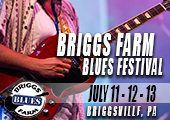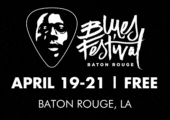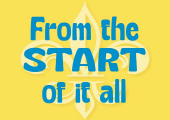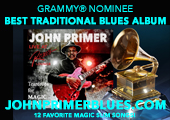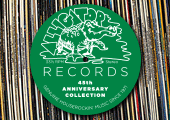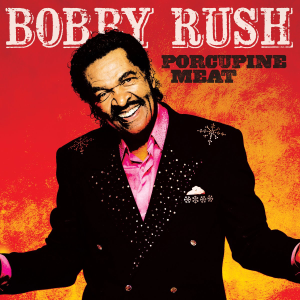 BOBBY RUSH
BOBBY RUSH
Porcupine Meat
Rounder – No #
Bobby Rush’s Rounder debut should cause rejoicing among longtime fans and newcomers alike. The indefatigable “funk folklorist” has lost none of his legendary transgressive wit or genre-straddling musical acumen, even as he has adapted himself with seeming effortlessness to producer Scott Billington’s live-in-the-studio aesthetic. Meanwhile, guest stars such as Vasti Jackson, Keb’ Mo’, Dave Alvin and Joe Bonamassa provide both musical muscle and further crossover potential.
Rush wrote or co-wrote all 12 of the songs here. For the most part, he reprises well-trod Rushian themes—celebrations of libido, sexual gamesmanship, adventures in cuckolding and other dispatches from the front lines of erotic combat—with typical good humor and self-deprecating irony, set to funk-driven, bluesy musical backings. This time out, though, the decidedly non-ironic sound (no wink-and-nod synthesizer punch lines, no electronic tweaks or timbral goofiness) brings a newfound gravitas to his even his most ribald storytelling.
The guests comport themselves admirably: Jackson’s fatback guitar work adds both deep soul and emotional resonance throughout (especially on the title tune, his showcase); Alvin contributes perkiness and sinew to the playfully signifying It’s Your Move; Keb’ Mo’s slide brings both texture and depth to Midnight Gardener, which introduces yet another metaphor for night-prowling sexual hijinks. And trust Bobby Rush to find a way to summon eloquence from even the usually bombastic Bonamassa, whose solo helps make Me, Myself and I a genuinely affecting soul-blues ballad with a pop-rock tinge. Meanwhile, the studio band attains a balance of emotional immediacy, musical depth and—yet again—seriousness of intent that never detracts from the playful mood of most of these tracks. (Special nod to the horns—their crisp riffing invokes, at various points, everything from vintage-era Stax to Tower of Power’s East Bay funk.)
It’s the serious offerings, though, that are most memorable. I’m Tired (subtitled “Tangle Eye Mix” in the notes—an insiders’ tribute to Big Walter Horton, perhaps?) is a bleak portrayal of the soul-killing vicissitudes of living in poverty, intensified by Rush’s from-the-gut vocals and plaintive harp wails. Even more impressive is Got Me Accused, based on Eddie Boyd’s Third Degree (with echoes of Tin Pan Alley here and there), but still strikingly original. The narrative of a falsely accused man awaiting trial is chillingly appropriate for today’s America (“What kind of justice can this be . . . seems like my life just don’t matter at all now”), and again it’s intensified by a plaintive, crying harp solo. This is Bobby Rush at his most poetic and uncompromising, buttressed as always by the studio band, especially guitarists Jackson and Shane Theriot, whose leads and chording interweave to create an atmosphere as haunting—and haunted—as Rush’s lyrics and harp work.
This is a masterful disc, recommended for blues, soul blues and southern soul lovers of all stripes.
—David Whiteis
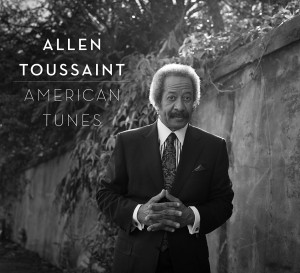 ALLEN TOUSSAINT
ALLEN TOUSSAINT
American Tunes
Nonesuch Records – NON 554644
Allen Toussaint’s American Tunes, completed just prior to his sudden death in November 2015, is a crowning achievement to an unparalleled, six-decade career of writing, performing and producing landmark recordings in genres ranging from R&B and soul to funk, jazz and blues, to rock ’n’ roll. He was not only the mastermind behind a parade of 1960s New Orleans hits by artists such as Ernie K-Doe, Irma Thomas, Lee Dorsey, Chris Kenner and Aaron Neville, he was also one of the primal architects of 1970s funk—working with the Meters, producing seminal recordings by Dr. John, the Wild Tchoupitoulas and Labelle. His talents as a producer and arranger were in demand with such major artists as the Band, Paul McCartney, Albert King and John Mayall. Although he recorded his first solo album in 1958 and released a series of first rate LPs in the 1970s (spawning countless cover versions of his tunes), it was not until the devastation of Hurricane Katrina and the failure of the levees in 2005 that Toussaint fully blossomed as a featured performer. One of the fruits of this new focus on his own career was the CD The Bright Mississippi (2009), produced by Joe Henry, which was a mostly instrumental exploration of jazz-oriented material from such masters as Jelly Roll Morton, Louis Armstrong, Duke Ellington, Django Reinhardt and Thelonious Monk. American Tunes is an extension of this approach with an added emphasis on linking the New Orleans piano tradition to the canon of jazz masters.
Throughout his career, Toussaint consistently pointed to Professor Longhair as his essential muse. Longhair’s influence on Toussaint’s piano playing is as apparent on his first recording, The Wild Sounds of New Orleans (1958), as it is on his late career, live CD/DVD recording, Songbook (2013). On American Tunes, he delivers solo explorations of three Longhair classics: Mardi Gras in New Orleans, Hey Little Girl and the Earl King–composed Big Chief. All three performances are stunning, both for his unique re-conceptions and astounding execution. While the Afro-Caribbean, blues rhumba groove is the magnet that draws listeners to the original versions, Toussaint deliberately emphasizes the lyrical aspects of Longhair’s compositions, turning funky riffs into dramatic, contrapuntal melodic lines. These tour de force performances are a testimony to his devotion to a hometown hero.
In the 1970s, Toussaint had an opportunity to make a documentary performance film with Longhair and Tuts Washington, another legendary New Orleans piano professor. Toussaint’s remark that “piano players rarely ever play together” provided the title for that film. Producer Henry created another opportunity for piano duets by bringing Van Dyke Parks into the sessions, and the two pianists work together to great effect on Southern Nights and, surprisingly, Louis Moreau Gottschalk’s 19th-century, classical composition Danza, Op. 33, which drew upon the composer’s exposure as a youth in New Orleans to the rhythms that percolated through the African drumming in Congo Square. The performances are dramatic and elegant and link Toussaint’s songwriting and piano playing to that crucial source point for American music.
Rejoined by bassist David Piltch and drummer Jay Bellerose from the Bright Mississippi sessions, Toussaint digs deep into a series of classic tunes drawn from the jazz tradition, including Fats Waller’s Viper’s Drag, the Louis Armstrong–associated Confessin’ (That I Love You), Earl “Fatha” Hines’ Rosetta, Billy Strayhorn’s Lotus Blossom and Bill Evans’ Waltz for Debby (which he recasts with a swinging Latin rhythm). Having worked with so many great singers over the years, Toussaint is fittingly joined by Rhiannon Giddens on this final studio outing. She exhibits an impressive stylistic range on two Duke Ellington numbers, the sassy, bravura blues of Rocks in My Bed and the classically informed, soulful meditation Come Sunday (which had been a signature collaboration between Ellington and New Orleans native Mahalia Jackson). Both tracks are embellished by Greg Leisz’ understated Weissenborn acoustic lap steel work. Other guests who enhance the program at various points include guitarist Bill Frisell and tenor saxophonist Charles Lloyd.
Toussaint’s sole vocal performance graces the final track on the hauntingly prescient American Tune by Paul Simon, which includes the lines: “And I dreamed I was dying / I dreamed that my soul rose unexpectedly / And looking back down at me / Smiled reassuringly / And I dreamed I was flying high.” The performance begins with the singer backed by a spare, strummed acoustic guitar and as the bass and piano join in, Toussaint brings American Tunes to triumphant conclusion.
—Robert H. Cataliotti
 VASTI JACKSON
VASTI JACKSON
The Soul of Jimmie Rodgers
Vast Eye Music – VJM39684
An album devoted to Jimmie Rodgers, a.k.a. “the singing brakeman” and “the father of country music,” might seem an odd choice for Vasti Jackson, a man who has earned his spurs as a thoroughly modern bluesman, but according to his notes, Jackson was moved to record a set of what is usually pigeonholed as “country music” because his own youthful attempts at hoboing left him with an affinity for Rodgers’ life experiences and, therefore, his music.
For his tribute, Jackson chose a nicely varied cross-section of the Rodgers songbook, including the sentimental Miss the Mississippi and You, the mournful lament of Hobo’s Meditation and the version of St. James Infirmary that Rodgers called Those Gambler’s Blues, as well as the multicultural staple He’s In the Jailhouse Now and such bluesier fare as Standing on the Corner, Ninety-Nine Years Blues, Waiting for a Train and The Women Make a Fool Out of Me. The set concludes with a pair of Jackson originals, the jaunty Lowdown Hoedown and Train Rollin’ Blues, with slide guitar playing that evokes Robert Johnson. Jackson’s guitar work, in fact, is a revelation throughout—he’s heard solo here, either acoustic or minimally amplified, and the result is utterly convincing—it’s almost as if a treasure trove of previously lost pre-war recordings had somehow surfaced in pristine condition.
It is, however, pointless to compare Jackson’s music to the Rodgers originals. He was clearly not attempting to be a copyist, as is evident from the absence of any effort to emulate Rodgers’ trademark blue yodel, but rather to distill the essence of Rodgers’ music for a new generation of listeners. At this, he has succeeded admirably.
—Jim DeKoster
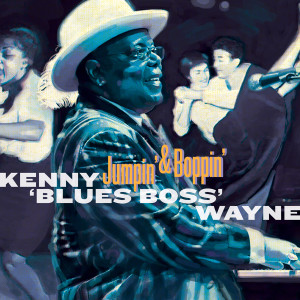 KENNY “BLUES BOSS” WAYNE
KENNY “BLUES BOSS” WAYNE
Jumpin’ & Boppin’
Stony Plain – SPCD 1389
Jumpin’ & Boppin’, vocalist and keyboardist Kenny “Blues Boss” Wayne’s third recording for Stony Plain, pays homage to the late 1940s / early 1950s originators of rhythm and blues, including Louis Jordan, Amos Milburn, Ray Charles, Johnnie Johnson and Fats Domino, which, of course, means that this is good-time music. Twelve of the tracks are Wayne’s original compositions, and they testify to how adept he has become in the jump blues idiom, sounding like they would be right at home on a juke box during the early days of R&B. He serves up one cover, the Ray Charles–associated You Don’t Know Me (written by Cindy Walker and Eddy Arnold).
Along with Wayne’s outstanding piano work and good-humored, soulful vocals, the sessions benefit from first-rate contributions from the rhythm section that consists of bassist Russell Jackson, drummer Joey DiMarco and guitarist Charlie Jacobson. Guitarist Duke Robillard and tenor/baritone saxophonist Dave Babcock both know what it takes to propel this music, and their solos really stoke the fire. This is apparent on the opening instrumental, Blues Boss Shuffle, which features smoking piano, tenor and guitar solos, and from that point on, there is no looking back. Blackmail Blues is a standout with the rhythm section laying down a hip, strutting groove marked by Wayne’s churchy organ fills. On the up-tempo Rock, Rock Little Girl, Wayne evokes Little Richard and Jerry Lee Lewis as he frantically pounds the 88s. Sherman Doucette’s riffing harmonica and blues-smeared solos drive the relentless boogie groove on I’m Coming Home. The slow blues Back to Square One evokes the legendary Charles Brown, featuring funky, double-tracked piano/organ interplay and a tasty solo from Robillard. The set closes with the ebullient boogie-woogie piano/bass/drums instrumental Boogie to Gloryland, providing Wayne with a showcase for his formidable chops. Anyone looking for a soundtrack to keep a party rocking should just slip this disc in and let it play. It is guaranteed to get the house Jumpin’ & Boppin’.
—Robert H. Cataliotti
 OMAR COLEMAN
OMAR COLEMAN
Live!
Delmark – DE 846
Barely one year after the release of his outstanding studio album Born & Raised, Delmark has doubled down on Omar Coleman with a new recording cut live at Rosa’s Lounge in Chicago. It’s not a risky bet for the label, however, as Coleman has successfully established himself as one of the finer next-generation harmonica players carving his own space out on the national scene.
Unlike many of his predecessors, Coleman did not start blowing harp before he learned to read or write. Although blues was a mainstay where he grew up on the West Side of Chicago (his mother owned a local bar where Bobby Rush used to play) and he can recall hearing legends like Sunnyland Slim and Eddie Taylor at the long-defunct Delta Fish Market, Coleman was in his mid-20s and working as a full-time barber when he first picked up the instrument.
As time went on, Coleman gradually worked his way into the city’s blues scene at weekly jam sessions, where he honed his chops and later befriended Sugar Blue. As Live! clearly demonstrates, there’s no question that he has come a long way since releasing West Side Wiggle on the small indie label Honeybee in 2011. Delmark’s production team, who has been recording live shows at Rosa’s for years now, knows how to expertly capture sound in that room, and Coleman pulls no punches in this high energy set.
With only one slow ballad in the ten songs here, the emphasis is on up-tempo soul blues and funk with a few satisfying old-school Chicago blues covers thrown in for good measure, including Two Headed Woman, I’m Ready and a confident interpretation of Snatch It Back and Hold It, a song many listeners will recognize from another landmark Delmark release (Junior Wells’ seminal Hoodoo Man Blues). His band, which features Rosa’s regulars guitarist Peter Galanis and keyboardist Neal O’Hara and is the same ensemble that performed on Coleman’s previous Delmark effort, backs him with gusto throughout.
Although over half of these tracks also appeared on Born & Raised last year, listeners will discover that Coleman and company breathe new life into each song when they’re able to feed off the energy of the live crowd at Rosa’s. Not only is the music great, but it’s also a pleasure to watch Coleman quickly ascend the ranks of the relatively small group of professional blues harmonica players who are forging their paths on today’s scene.
—Roger Gatchet
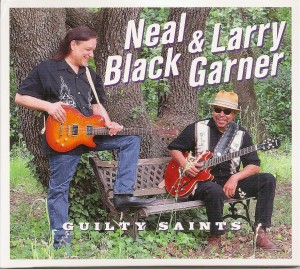 NEAL BLACK & LARRY GARNER
NEAL BLACK & LARRY GARNER
Guilty Saints
DixieFrog – DFGCD 8787
It comes as something of a shock to realize that it’s been a quarter-century since Baton Rouge guitarist Larry Garner first earned accolades as one of the blues’ hottest young songwriters and performers. Though he has recorded a dozen more albums since, he’s never really garnered the attention that he deserves in his home country, instead recording for European labels such as JSP, Ruf, Gitanes and most recently DixieFrog, which has teamed him here with label mate Neal Black, the gravel-voiced, San Antonio guitarist who likewise seems to enjoy a more devoted following in Europe.
Of the set’s dozen songs, ten were penned by Garner and/or Black with a few assists from the bandsmen, the two exceptions being Mary Frye’s poem Do Not Stand at My Grave and Weep and the old Jimmy Hughes classic Neighbor, Neighbor that closes the set with another DixieFrog artist, Leadfoot Rivet, lending a vocal assist in place of Garner. While Garner has three vocals to himself and Black two, most tracks find the two men trading verses or even lines. While the songwriting is a cut above throughout, the highlights are God Today (“It’s a damn good thing I’m not your god today / You’d wake up in the morning being the person you hate”) and Saints of New Orleans (“The mayor was dancing at Tipitina’s with a Livingston Parish transvestite / And there are no saints on the streets of New Orleans tonight”).
Musically, the setting is well-executed, mainstream contemporary blues, with space allotted to Mike Lattrell’s keyboards and Pascal “Bako” Mikaelian’s harmonica. The spotlight, however, remains on the two leaders, and both come through with flying colors on this highly worthwhile release.
—Jim DeKoster
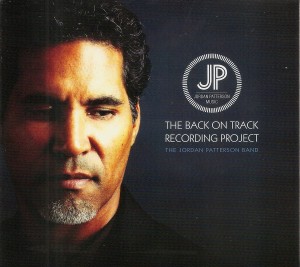 THE JORDAN PATTERSON BAND
THE JORDAN PATTERSON BAND
The Back on Track Recording Project
Flamingcheese – FC2016-0201
In 2014, Canadian-born singer / harp player Jordan Patterson released the tight four-song EP The Back on Track Recording Project (reviewed in LB #236), so-titled because it marked his first major recording since his debut on JSP Records in 1996, Give Me a Chance. Patterson spent the intervening years working behind the scenes as a tour manager and concert promoter and battling some health issues. Now a fully realized album with the same title, The Back on Track Recording Project combines remastered versions of those EP tracks with six new originals.
Whereas Give Me a Chance showcased more straightforward 12-bar blues and funk (and guest appearances by Bobby Rush and Bobby Parker), this unabashedly guitar-forward record represents a new vision that is squarely situated in the realm of contemporary blues rock. Guitarists Darryl Romphf and Bobby Thompson, bassist Mark McIntyre and drummer Benjamin Rollo execute that vision with great skill and aplomb, starting off with the punchy, mid-tempo opening number Favourite Boy, followed by the emotive ballad Can We Fall in Love Again, which features lovely backing vocals from guest singer Skyler Jordan.
Those who were hoping for a more harp-centric album may be disappointed to find that Patterson’s blowing is underemphasized on many of these tracks, but there are notable exceptions: the earnest rockers She’s Cool and Play My Song–Revisited, or the gutsy slow blues If You’d Help Me Please–Revisited (the original EP’s tracks are all subtitled Revisited). Even when amplified it can be difficult for harmonica soloists to cut through the sonic maelstrom on a guitar-heavy recording such as this one, but Patterson deftly negotiates that challenge by punctuating (rather than competing with) his guitarists’ leads.
While the album’s crisp production and contemporary aesthetic may be anathema to some hardcore traditionalists, Patterson and company’s return to the studio should find receptive audiences amongst those who enjoy the blues rock alchemy of artists such as Joe Bonamassa, Johnny Lang or Tinsley Ellis.
—Roger Gatchet
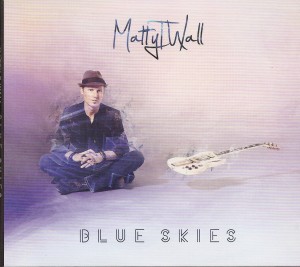 MATTY T. WALL
MATTY T. WALL
Blue Skies
Hipsterdumpster Records – No #
Matty T. Wall’s musical journey has encompassed metal, jazz and funk, yet he ultimately fell in love with the blues after investigating the influences of rock musicians such as Eric Clapton and Stevie Ray Vaughan. The native of Perth, Australia, has just released his debut album, and Blue Skies is a strong showing from the promising young guitarist and singer-songwriter.
Wall’s playing incorporates aspects of those genres and more into his particular brand of contemporary roots rock. Touches of gospel round out the summery, jam-band feel of the title track, while the jazzy, spoken-word delivery of Broken Heart Tattoo’s lyrics is framed with searing roadhouse riffs. His slender, strong tenor is touched with sweetness, and his impassioned soloing echoes his vocals on the anguished Love Gone Away and This Is Real. The fretwork in Burnin’ Up Burnin’ Down and the frenetic instrumental Scorcher live up to their names, but he’s capable of a subtler touch, too—the gently rolling Smile is a bittersweet instrumental, and the understated emotion he wrings out of the strings is an album highlight.
Three covers complete the ten-song tracklist. Am I Wrong amplifies and electrifies the restless spirit of Keb’ Mo’s original. Wall stretches Jimi Hendrix’s Voodoo Chile out past 11 minutes, shooting screaming, scrambled licks into the stratosphere. His version of Robert Johnson’s Hellhound on My Trail opens to the sound of ocean waves, then segues into a pounding, insistent beat, injecting Johnson’s eerie composition with a sweeping, cinematic dread.
Matty T. Wall’s Blue Skies is filled with skilled, imaginative playing and songcraft, and it’ll be interesting to see what’s beyond the horizon for him.
—Melanie Young
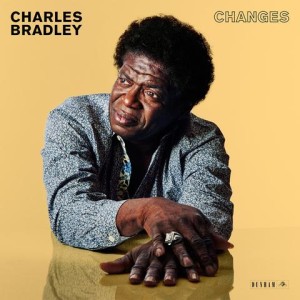 CHARLES BRADLEY
CHARLES BRADLEY
Changes
Daptone – DAP-041
Soul man Charles Bradley continues to impress—no, stun—with his third studio album, a remarkable testament to one man’s desire to pursue his musical dream. Born in Gainesville, Florida, in 1948, Bradley’s life is chronicled in Poull Brien’s moving 2012 documentary Charles Bradley: Soul of America, a film that traces Bradley’s journey from humble cook to James Brown impersonator to one of the cornerstone artists (along with Sharon Jones & the Dap-Kings) of Daptone Records. Rolling Stone named his full-length debut on Dunham (a subsidiary of Daptone) one of the best albums of 2011 and called Changes one of its most anticipated releases of 2016—a list that found the 67-year old vocalist in the company of icons such as David Bowie, U2 and Sir Elton John.
As is true of so many of Daptone’s releases, the top-notch production and studio musicians evoke the warmth and feel of a 1960s-era Stax recording without trying to sound retro. Changes finds Bradley backed by Daptone staples the Menahan Street Band and Budos Band, and his impassioned vocals evoke what music journalist and former LB contributor Thomas Fawcett calls a “righteous street preacher.”
Although Bradley is at his most compelling when belting out a stirring soul number, all those years spent singing from the James Brown songbook as his alter-ego “Black Velvet” in Brooklyn bars has given him both the vocal chops (he’s got the Godfather’s trademark scream down pat) and street cred to execute heavy funk with authority in the form of Good to Be Back Home and Ain’t it a Sin. “If you ain’t gonna do me right,” he warns, “I might just do you in. Ain’t it a sin?”
On an album replete with poignant performances, most will remember Changes for its title track, a mesmerizing interpretation of Black Sabbath’s reserved 1972 piano ballad. Originally released by Dunham/Daptone as a seven-inch single in 2013, the line repeated in the song’s mournful chorus—“I’m going through changes”—took on a deeper level of meaning for Bradley when his mother passed away the following year. A soul singer covering something Ozzy Osbourne once sang? One may have to hear it to believe it, but Bradley, supported by Menahan Street’s horn section, is nothing short of stunning on the track.
For readers not yet convinced to add this release to their library, Bradley makes a powerful case in Daptone’s video for the single (search for it on YouTube or the label’s website). He sings nary a word during its six-minute, tear-inducing run time; instead, the camera focuses entirely on Bradley’s pained face, and his eyes and facial expressions convey how deeply personal the song has become for him.
—Roger Gatchet
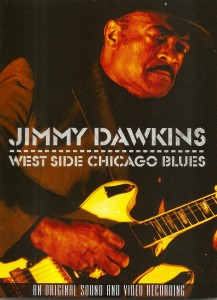 JIMMY DAWKINS
JIMMY DAWKINS
West Side Chicago Blues
JSP Records / Blues Archives – JSP5809-DVD
Jimmy Dawkins was a known master blues guitarist—a certified legend on stage and on record. He was also one of his generation’s most knowledgeable and articulate spokesmen when it came to deep blues experiences in Mississippi, as well as on Chicago’s South and West sides.
The English JSP / Blues Archives’ new DVD, West Side Chicago Blues, captures a rare, live Dawkins performance in its apparent entirety at a Welsh blues festival in July of 2000. For that alone, this disc is a must for any modern Chicago blues fan’s video library.
Unfortunately, the performance is somewhat tepid by Dawkins’ standards. He works with a competent pickup band, but understandably, the ensemble lacks familiarity with Dawkins’ music and the confidence necessary to deliver its skull-crushing form. The outfit, at times, needs unusually patient prodding from its maestro. For Jimmy to be at his best, he often seemed to need the understanding, experience and camaraderie of his longtime Chicago bandmates and friends, and this soulful and eccentric crew is a costly trans-Atlantic flight away this night.
Although the concert, at least until the final two songs, lacks the “sizzle” Jimmy was known to generate at home, it is an enjoyable set. This cold night in Wales, Dawkins serves up laid-back versions of songs common to his Chicago club performances of the era, including All Your Love and Goin’ Down. He also throws in a special treat, Lonely Guitar Man from 1994’s Blues and Pain CD. The concert was a multi-camera, pro-shot affair and is mostly one long close-up of Dawkins working on his worn, beloved, blond Gibson. Sound is close to perfect for the period.
West Side Chicago Blues is one of those special DVDs that is two musical gifts in one, because following the concert, Jimmy sits down for a 31-plus minute conversation in which he offers detailed, candid recollections of things he had not mentioned elsewhere. The occasionally temperamental Dawkins is calm, in a great mood and gives a top-notch interview. Smiling, eyes gleaming at times, Dawkins remembers incredible minutiae from his days upon arrival in Chicago in 1956 and beyond. This is priceless stuff, and to see Jimmy in such a seemingly everyday chat while overseas is heartwarming and downright surprising. Any blues fan will come away from hearing this man’s words rightly feeling as if they have just attended a university lecture by a kind and tenured Professor Dawkins.
This disc will certainly be in the conversation when it comes to LB’s Blues DVD of the Year, as critics and readers consider the offerings of 2016.
—Steve Sharp


